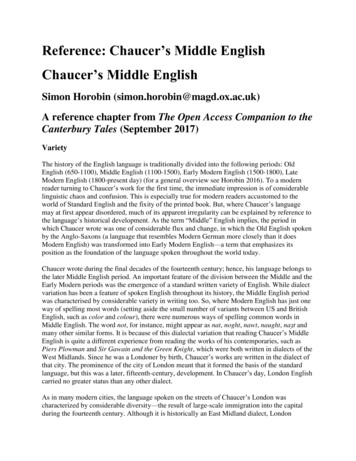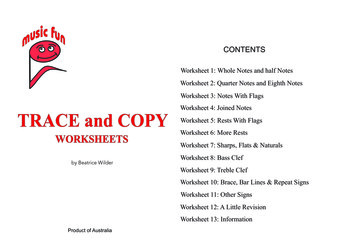
Transcription
ENGLISH TEXT SUMMARY NOTES“This Boy’s Life”Text guide by: Justine Robbins
This Boy's Life2Copyright TSSM 2014TSSMACN 099 422 670ABN 54 099 422 670A: Level 14, 474 Flinders Street Melbourne VIC 3000T: 1300 134 518F: 03 97084354W: tssm.com.auE: info@tssm.com.auQuotes in this text guide were taken from the 1999 Bloomsbury Publishing edition. Page numbers may varybetween different editions.
This Boy's Life3ContentsAUTHOR NOTES . 4GENRE . 5STRUCTURE . 6STYLE . 7SETTING. 8Historical Context . 8PLOT SUMMARY. 9CHARACTER PROFILES. 26THEMES AND ISSUES . 32IMPORTANT QUOTATIONS . 35Sample Essay Topics . 37FINAL EXAMINATION ADVICE . 38REFERENCES . 39
This Boy's Life4AUTHOR NOTESAbout the authorTobias Jonathan Wolff was born on the 19th of June, 1945 in Birmingham, Alabama to Rosemary Loftus andArthur Wolff. A renowned American writer, Wolff is best known for his short stories and his memoir ‘ThisBoy’s Life.’ After a troubled childhood and adolescence, Wolff joined the Army and served in Vietnam wherehe became an advisor for the South Vietnamese military. Upon his discharge, he moved to England andattended Oxford University where he graduated with first class honours in 1972 and began his writing career.This was followed by an M.A from Stanford. Wolff has received many commendations and awards for hiswork, most notably the PEN/Malamud Award and the Rea Award, the Los Angeles Times Book Prize, and thePEN/Faulkner Award. He is currently a Professor of creative writing at Stanford University.Childhood and adolescenceWolff’s memoir traces his experiences of a nomadic childhood and difficult adolescence living with hisstepfather in Chinook, Washington. Wolff’s parents divorced when he was young and Wolff and his mothertravelled from state to state trying their luck as his mother desperately tried to build a better life for them. In anattempt to transform himself, Tobias changed his name to Jack. Growing up, he was involved in a string ofincidents at school, told lies, stole, and drank. He was accepted to, and expelled from Hill, a preparatoryboarding school. In ‘This Boy’s Life’ Wolff reflects on his life from 1955 to 1965 and the many facades heassumed along the way.
This Boy's Life5GENREMemoirWolff’s account of growing up in post-war America is a memoir. Whilst similar to an auto-biography, amemoir differs in that it is a detailed account of a specific aspect of a person’s life, which in Wolff’s casechronicles his years on the road with his mother and the circumstances that led to them living in Chinook withhis aggressive Step-father. Wolff’s recreation of the events of the past in this memoir gives readers an insightinto his motivations as a troubled teenager.The main characteristics of a memoir that can be found in ‘This Boy’s Life’ include:Relevant themesThe success of memoirs is dependent on the ability of the reader to connect with the themes explored by theauthor. Hope, the search for freedom, personal loss, and the longing for the meaning of life are few of themany universal themes in the text that readers can find relevant in their own lives. Wolff’s reflection on hisyears in Chinook examine the frustrations and cruelties of adolescence.SincerityA great storyteller, Wolff writes in an honest and sincere tone. His ability to admit, in hindsight, that he knewexactly what he was doing at times and still failed to feel remorse, along with his revelations about his constantlies conveys a sense of vulnerability and authenticity to his words.ReflectionThe ability to reflect on one’s past is crucial to a memoir. Not only is the ability to give a detailed description ofthe past important, but as Wolff demonstrates, there must be a sense of self-reflection on one’s actions andmotivations.
This Boy's Life6STRUCTUREThe memoir is separated into seven sections named: Fortune, Uncool, A Whole New Deal, Citizenship in theHome, Citizenship in the School, The Amen Corner and Amen. Each section is titled appropriately for thespecific events outlined in the chapters within it. The titles represent the different phases in the author’s life.For instance, the story begins with ‘Fortune’ and these chapters outline the fruitless pursuits by Jack and hismother to find fortune and his mother’s optimism, and at times denial, in the face of failure. The shortestsection of the text, ‘A Whole New Deal’, is one of the most important parts of his life, which he separates fromthe others. In ‘A Whole New Deal’, Jack is sent away to live with Dwight where everything changes, and hisproblems increase.Except for a few instances where Wolff employs hindsight to explore a connection to a later event in his life,most of the narrative is in chronological order, in other words the events are in the sequence in which theyoccurred. However, this changes in the final section, ‘Amen’ where Jack fills the reader in on his time with hisfather and the time he spent at Hill before ultimately being asked to leave. In his final paragraphs, he returns tothe moment in time where things were ‘burning bright’ as he and Chuck left Seattle, feeling good. The text endswith a sense of optimism for what lies ahead for Jack, even though we have just read that things did not workout at Hill.
This Boy's Life7STYLEThe memoir is written in the first person and in the past tense. All recollection of events are from Jack’s pointof view. While this enables readers to have a clearer understanding of his character, it is important to note thatall observations made about other characters in the story are from Jack’s point of view which prevents readersfrom being able to form unbiased opinions about them.Wolff’s contemplative style is enhanced by the fact that he is able to evaluate and analyse past events asthough he was an outsider. Not only does shedding his original name of Tobias Wolff allow him to create a newidentity for himself in Jack Wolff, it also allows him to write in a more reflective way about Jack Wolff’s past.Wolff’s engaging storytelling is enhanced by his simple, authentic dialogue.
This Boy's Life8SETTINGThe story begins with the narrator and his mother crossing the Continental Divide as they drive from Florida toUtah. They try their luck at finding uranium in Salt Lake City before they are once again on the move. Thistime their destination is Seattle. Jack and his mother live in a boarding-house in Seattle before moving into theirown house shared with two other ladies. It is here where their nomadic lifestyle ends and Jack is sent to livewith Dwight in Chinook, a tiny village three hours north of Seattle, in the Cascade Mountains.Chinook is a company village where a couple of hundred people live in ‘neat rows of houses and convertedbarracks’ (56). The residents live here in ‘the camp.’ The village is surrounded by deep mountains and theslopes were ‘heavily forested’ (56). While Dwight tries to highlight the advantages of life in Chinook, hischildren understand that it is isolated. Chinook does not have a high school, and the children travel toConcrete, 40 miles down the river to Concrete High. Once Jack moves to Chinook, he spends much of hisadolescence yearning to escape.Historical ContextThe memoir covers the time period spanning from 1955 - 1965 but makes references to events outside of thistime frame. Wolff reflects on 1950s post-war America. Jack and his mother dream of a better life and head toUtah to find Uranium like so many others who ‘were getting up poor in the morning and going to bed rich atnight’ (5). They find they are ‘months too late’ and the mining towns had been ‘overrun’ (5).Jack refers to the days before ‘the Crash’, referring to the Stock Market Crash of 1929 where his mother’s‘Daddy’ lost all of his money. He refers to both World War II (1939-1945) and the Korean War (1950-1953)when he discusses men he knows who have served, and he also refers to his own service in the Vietnam Warwhich the USA were involved in from 1961-1973.
This Boy's Life9PLOT SUMMARYPart 1: FortuneChapter 1Part 1 begins with Toby and his mother crossing the Continental Divide as they leave their past in Sarasota,Florida in a bid to change their luck. They are running from her abusive ex-boyfriend. Their car, a NashRambler, continuously overheats on this journey and while waiting for it to cool they witness a truck going overa cliff presumably because he ‘lost his breaks.’ It is here that we see Toby take advantage of his mother’semotions after witnessing this accident. He understands that her guard is down, and that the time is right to askfor souvenirs.We learn about his mother’s past including her father’s loss after the Crash, her life of hard work that had yet tolead anywhere, her divorce from Toby’s father, and her long relationship with Roy, a violent man.In search for a better life, they are both caught up in a delight for freedom and transformation and although hismother had been warned there was no work in Salt Lake, she had come anyway because his letter ‘was sofriendly!’ (6). They drive through the desert, singing, and chasing their dreams.Chapter 2It is in Chapter 2 that Toby leaves his past and name behind to transform into Jack Wolff. He sheds the namehis father has given him and chooses Jack, after Jack London, a name that he believed would give him the samestrength and competence that the original bearer of the name had.Roy has tracked them down and is spending most of his time at their apartment. We quickly see exactly whythey ran from him in the first place, as he is continually checking up on Rosemary and is obviously possessiveand aggressive.
This Boy's Life10In this chapter we see Jack’s insecurities. Even though he thought he had left this all behind in Florida, he feelsfeelings of unworthiness. His pen pal letters to Alice in Phoenix highlight the lengths Jack goes to presenthimself in a superior way, as he adopts the facade of a boy who lives on a ranch and is impressively athletic,believing that she would be in awe of him. Jack also cannot be truthful during his first confession and adoptsSister James’ confessions as his own, rather than confessing his own sins. He is praised by both the priest andthe sister afterwards.Chapter 3In Chapter 3, Jack is given a Winchester .22 rifle from Roy. Although he has promised his mother never to takethe rifle out and play with it without her or Roy around, it is not long before he breaks this promise as he cannotresist the power that he feels when holding the weapon. He poses with the weapon and wears Roy’s old Armyuniform to disguise himself as a sniper. He moves deeper into the sniper fantasy as he begins to turn theapartment into a fort and pretends to shoot people travelling down his street, finally shooting a squirrel. Hefeels badly about this and cries that night after burying the squirrel with his mother.He avoids the apartment when he knows he will be alone with the rifle, but soon takes up his afternoon habitagain. It is only when he is almost caught by Sister James and hides, dressed in camouflage with the rifle, thathe realises the absurdity of the situation. She leaves a note for his mother, which he reads and burns. The notesimply asks his mother to call her. Jack tells us that this is the last time he was to see Sister James.This chapter explores Jack’s lack of identity as he grasps onto any image of himself he can create.“All my images of myself as I wished to be were images of myself armed. Because I did not know who I was,any image of myself, no matter how grotesque, had power over me” (22). He also notes that being so close tothe ‘robust identity’ of Sister James made him realise the ‘poverty’ of his own.Chapter 4In this short chapter, Jack and his mother pack up once again to leave Roy behind and make their way toSeattle. When he arrives home from school and hears his mother singing and moving quickly ‘everything about
This Boy's Life11her flushed with gaiety’ (25) he knows they are leaving. He, too, quickly gets caught up in the rush of dreamingabout new adventures as they ponder what opportunities await for them.Part 2: UncoolChapter 1Jack and his mother live in a boarding-house in Seattle. They spend their evenings not just fantasising aboutbuying a house, but pretending they are actually considering these houses for future purchase. In theirdelusions, they turn their noses down at anything that they think is beneath them, though the duplex’s they‘sneered‘ at would have been better than their current living arrangements. While living in the boarding-househe encounters Marian whom he knows, she realises that he pretends to be someone else and sees through him.Jack and his friends Terry Taylor and Terry Silver spend their afternoons watching Annette on the Mickey MouseClub.The boys know they are uncool but keep trying regardless. Jack reflects on the fact that they were‘claimed by ‘uncoolness’. When they watch the show the boys begin by make sexually explicit comments aboutAnnette before they sit back and enjoy the show, experiencing some form of a normal childhood through theshow. They even let Taylor get away with sucking his thumb while watching the show. Jack has stoppedwriting letters to Alice and has begun writing to Annette. These letters, however, are deemed inappropriate andhe is taken off of the mailing list. Jack lets his imagination run away with him when he pictures suffering atragic accident outside Annette’s house, which would lead her to care for him, sympathise and love him.Chapter 2Jack and his mother spend their day in the park watching mock navy battles when two men begin talking tothem. Jack is not interested at first, but the men realise that to spend time with Rosemary, they need to payattention to him, which leaves him satisfied. They make promises of a brand new bike for him, but nothingcomes of this.
This Boy's Life12Gil asks Rosemary out, but only honks when he picks her up, which Marian is not impressed with. Later thatnight Rosemary returns, crying, and Jack puts his arms around her and soothes her, as he is used to doing. Thischapter highlights the dependency that exists between Jack and his mother.Chapter 3In Chapter 3, Jack and Rosemary move into a share house with Marian and Kathy. The house is in a state ofdisrepair, but Rosemary’s optimistic nature helps them to picture the better house it may come to be afterrepairs. These repairs do not happen. It is in this chapter that we begin to see more of Jack’s troublesomeactions. Jack tells lies, which Marian can see right through. Jack and his friends break windows in the schoolcafeteria, and after getting away with it they begin to feel more self-importance and arrogant and begin to breakmore windows, street lights, vandalising property and stealing. Jack thinks of himself as a master thief but inhindsight Wolff can see that he was a ‘transparent klepto’ but it was probably too much bother to the ladies hewas stealing from to report him. Jack takes stealing more seriously than the other two boys, but curiously, oncethe items have been stolen they no longer interest him. Jack also explains that his mother is unable to disciplinehim properly because of how she was treated by her own father.This chapter also outlines some of the relationships that Rosemary enters into which do not lead anywhere.Jack’s initial introduction of Dwight after discussing the others - ‘And then came Dwight’ - signifies to thereader the importance that Dwight will have on their lives. Jack initially does not believe that the relationshipwill work out. Just as Marian can see through Jack’s persona, Jack can tell that Dwight is trying too hard andmakes fun of him, mimicking his ways.Chapter 4They spend Thanksgiving in Chinook with Dwight’s family. Dwight lives in a converted army barracks andupon seeing Rosemary’s reaction to the small, dark place, he declares he will renovate. Jack does not likeDwight’s daughter Pearl but is enamoured by Pearl’s older sister Norma whom he describes as ‘ripe and lovely’(54).
This Boy's Life13In this chapter we get our first glimpse of the real Dwight. After telling Jack that he would be able to participatein the Turkey shoot, he reneges on this promise, claiming he didn’t realise the rules didn’t allow for children toparticipate. Jack can tell that he is lying, but is unable to do anything about it. Rosemary decides to participateand ends up winning the tournament. Dwight blames his bad score on the gun and makes excuses for why hedid not shoot better. He sulks when Rosemary wins but eventually perks up. It is clear in this chapter thatDwight is not the easy going, friendly man that he makes himself out to be.When Dwight drives them back to Seattle the next morning he points out the salmon that have come from theocean to spawn there, but are dying because of the change from salt to fresh water.Chapter 5After telling Silver and Taylor tales about his Thanksgiving where they see through his lies, Jack becomesangry and defaces the bathroom wall, writing ‘F**k You’ with his knife. This time Jack is caught and findshimself in the Vice Principal’s office pleading his innocence. After arguing for half an hour, Jack even comesto believe his own innocence. When his mother arrives he lies to her and insists that he is not to blame for whatis written in the bathroom and that the witnesses must be lying. His mother demands to speak to the Principal,where she gets him out of his suspension.Dwight convinces Rosemary that Jack should move to Chinook to start over and she should follow if it workedout. Rosemary asks Jack, and thinking that he has no choice, he agrees.Part 3: A Whole New DealThere is only one chapter in Part 3. In ‘A Whole New Deal’ Jack moves to Chinook and his drive up themountains with an aggressive and drunk Dwight is a prelude to the things to come. Dwight goes out of his wayto kill a Beaver on the side of the road and after attempting to make Jack pick it up, he gets it into the trunk forthem to skin later. Dwight stops at the Tavern to get drink as Jack waits in the car. He thinks about why heagreed to move to Chinook.
This Boy's Life14“I had agreed to move to Chinook partly because I thought I had no choice. But there was more to it than that.Unlike my mother, I was fiercely conventional. I was tempted by the idea of belonging to a conventionalfamily. . . And in my heart I despised my life in Seattle” (74).This passage highlights Jack’s longing to belong to a family, to have stability and to be cared for. Unfortunatelythis is not what he gets when he moves to Chinook.Jack also admits to wanting to escape his identity again and leave the people who had already made up theirminds about him. He considers how he could be different and present himself as a boy of dignity. If peoplebelieved him, he could then actually be that boy.He listens to the radio softly as he waits for Dwight who returns drunk and drives dangerously up themountains. The chapter ends with Jack bracing himself for the next curve, and everything that is sure to come.Part 4: Citizenship in the HomeChapter 1To keep Jack busy so that he does not have time to cause trouble, Dwight gives him many things to do. Hesigns him up for Boy Scouts, a newspaper route and has him husking horse chestnuts each night which givesJack cuts and bruises all over his now orange stained hands. Norma and Skipper sympathise with Jack’ssituation but do not do much to help it. When Jack visits his mother with Dwight, he lies and says thateverything is fine and is revolted by the roles he and Dwight play in front of her, however he feels powerless tostop it. While he delivers his papers at night, he dawdles, wanting to be anywhere else and imagines himself assomeone else, doing brave and selfless deeds. Jack also reads Skipper’s old Scouts Handbook every night,scouring for easy merit badges to obtain. When he reads Boy’s life, the official Scout magazine, he pretends thathe is the same as all the other boys that they celebrate.
This Boy's Life15Rosemary accepts Dwight’s proposal. She tells Jack that it is still not too late to pull out of this situation if he isnot happy. Jack thinks that it is too late and that he was fated to live a miserable existence.Dwight and Jack paint the entire house white, including all of the furniture until everything is a stark white andthe house smells of oil. They even carefully paint every part of the piano (except for the black keys) because itstands out too much. Dwight is attempting to freshen the place up for Rosemary’s arrival but is really justcovering up imperfections with this severe, industrial strength layer of white paint.Chapter 2Jack gets into a fight with Arthur Gayle and after some back and forth name calling, Jack calls him a sissy. It iswhen he sees Arthur’s reaction to this that he realises he has never seen anyone call him a sissy to his face.They fight and Arthur gets the better of him in the end and insists that he takes it back. Jack must say ‘You’renot a sissy.’ Rather than being mad as they had expected him to be, Dwight is pleased to hear about this fightand shows Jack some dirty techniques to get the better of an opponent in a fight. Upon their next confrontation,rather than fight, Arthur and Jack begin to become friends.Chapter 3Jack describes Skipper’s car that Skipper has been working on so that he could take a road trip to Tijuana. Jackmistakenly believes that Skipper will consider taking Jack with him on this trip and imagine himself leavingChinook and riding shotgun with Skipper. When he realises that this isn’t going to happen, and when Skipperleaves, he begins to feel more cramped and confined in the house and Chinook. He begins hitchhiking, goingfarther down the valley. When he gets off, he hangs around for a few moments and hitchhikes back, making ithome before his mother and Dwight.Chapter 4In Chapter 4 Jack begins playing basketball. He must play in street shoes as he has outgrown his sneakers andDwight refuses to buy him knew ones until he ‘decides’ what size his feet are going to be. Bobby and Norma
This Boy's Life16drop Jack off to these games. Jack finds it difficult to play in his street shoes and is constantly slipping orfalling down. A woman who has been making shrieking sounds in the crowd that distress Jack and make himclumsier continues to shriek and bark and is escorted out by her embarassed companion. After this, Jack feelslike the atmosphere in the crowd has changed and that they are actually on his side.They lose the game and on the way home Jack comes to a realisation about Norma and Bobby’s relationship.He feels angered and betrayed, obviously having believed in his fantasy of being with Norma. He mentallytakes back all of the gifts he was going to give her before deciding to forgive her.Chapter 5Dwight, Pearl, Rosemary and Jack are on their way back from another successful visit to a rifle club match forRosemary, and an unsuccessful one for Dwight. He berates Rosemary on the drive back before stopping at theTavern. Pearl and Jack wait in the car and when he gets bored, Jack wanders around and pretends that he issomeone else for a while. He longs to talk to Pearl for some company, but because their ‘official position’ isthat they hate each other, he does not do this. They do, however, turn on the radio to sing together to pass thetime. They sing together smiling and passing the time before Dwight and Rosemary return to the car andDwight drives dangerously, scaring everyone in the car.In this chapter Jack admits that he is lying and stealing again. Even though he knows that Dwight isn’t wrongwhen he calls him a liar and a thief these accusations don’t hurt him because he doesn’t actually see himselflike this. He does, however, get into fights to make sure that he isn’t seen as a sissy and he learns how to act forpeople to treat him in different ways. This chapter also reveals more about the changing nature of Dwight andRosemary’s once pleasant relationship. Dwight constantly barrages Rosemary with insults about Jack andherself and, overhearing these, Jack imagines killing him with his Winchester.Chapter 6Jack snoops through his mother’s belongings and finds an address for an uncle who lives in Paris. Jack writesabout their life in Chinook and asks for help to give them a new start in Paris. While Jack certainly isn’t living a
This Boy's Life17good life in Chinook, he paints a nightmarish picture of events to his uncle and once again he gets carried away.When his Uncle Stephen writes back, Rosemary intercepts the letter and questions Jack about what he wrote.The letter explains that it would be difficult to get them both started in Paris, but suggests that Jack come on hisown for a year or so while his mother leaves Dwight and sets up a new life for them. Dwight, of course, isenthusiastic about Jack’s move to Paris. Jack prepares for his trip by imagining the Paris he sees in Americanmovies and buys a harmonica.When the next letter arrives suggesting it would actually be better for them to adopt Jack as his own son, Jackand his mother have a lot to consider. Readers can tell that Rosemary’s brother and his wife think that Jackwould be better off with them than with his flighty sister. In the end, while Rosemary leaves the decisionentirely up to Jack, the reason he does not go is because he does not want to change his last name. What littleidentity that he has, he holds onto and he knows he is his mother’s son and nobody else’s. None of his friendspay much attention to his move to Paris falling through because they think it was just another one of his stories.Chapter 7After graduating Concrete High and moving to Seattle, Norma returns home for Christmas and brings herfiancé Kenneth with her. She has decided to marry Kenneth instead of Bobby and does not explain her decisionto anyone. Dwight gets into the holiday spirit and cuts down a tree with Jack, which he then spray paints withwhite paint. Instead of lightly spraying it to imply snow, Dwight covers the entire tree with three coats. Thepaint kills the tree and makes it difficult to hang decorations on.No one likes Kenneth. He deliberately insults the family and their beliefs. Even Dwight is appalled byKenneth’s holier-than-thou demeanour and he tries to convince Norma not to marry Kenneth . Readersunderstand why she felt she had to marry quickly because she gives birth soon after.That Christmas Dwight and Jack go up to the attic to find the chestnuts that he shucked two years ago. Theyfind the boxes covered with mould. They also find the beaver that Dwight had run over covered with a whiteand transparent, almost cotton candy, type of mould. There is only pulp left and the mould is shaped like thebeaver it has consumed. In this chapter, Wolff shows how dramatically things have changed, using the mould
This Boy's Life18over the chestnuts to highlight how much time has passed and as the mould covers and destroys the chestnuts,so has time changed the once vibrant Norma and happy Bobby.Chapter 8By the time Jack starts at Concrete High, he has successfully stolen and saved 80 which he plans to use to runaway from Chinook. He plans to run away during the Scout’s trip to Seattle and though initially he tells Arthurthat he cannot come with him, he relents because he is afraid to be alone.Unlike his fantasies of adopting new personalities and leaving Chinook, Jack had real intentions and a plan toleave. He competes in his swim heats and loses after a couple of rounds which surprises him. Jack gets caughtup with Ballard boys who he tries to impress. He deliberately stays away from Arthur, fearing that he will becompared to him. In trying to impress the boys from Ballard, Jack loses his money at the carnival when he istargeted by Smoke and Rusty who convince him to continue to play their game. He continues to hand over billsuntil his wallet is empty. While the Ballard boys have been cheering him on during the game, Jack loses themshortly after.While Arthur and Jack wait to be picked up, knowing they are no longer leaving, Jack asks Arthur to d
This Boy's Life 5 GENRE Memoir Wolff’s account of growing up in post-war America is a memoir. Whilst similar to an auto-biography, a memoir differs in that it is a detailed account of a




![English Text Book[1] - Weebly](/img/4/comprehension-and-communication-skills-in-english-engl101.jpg)






